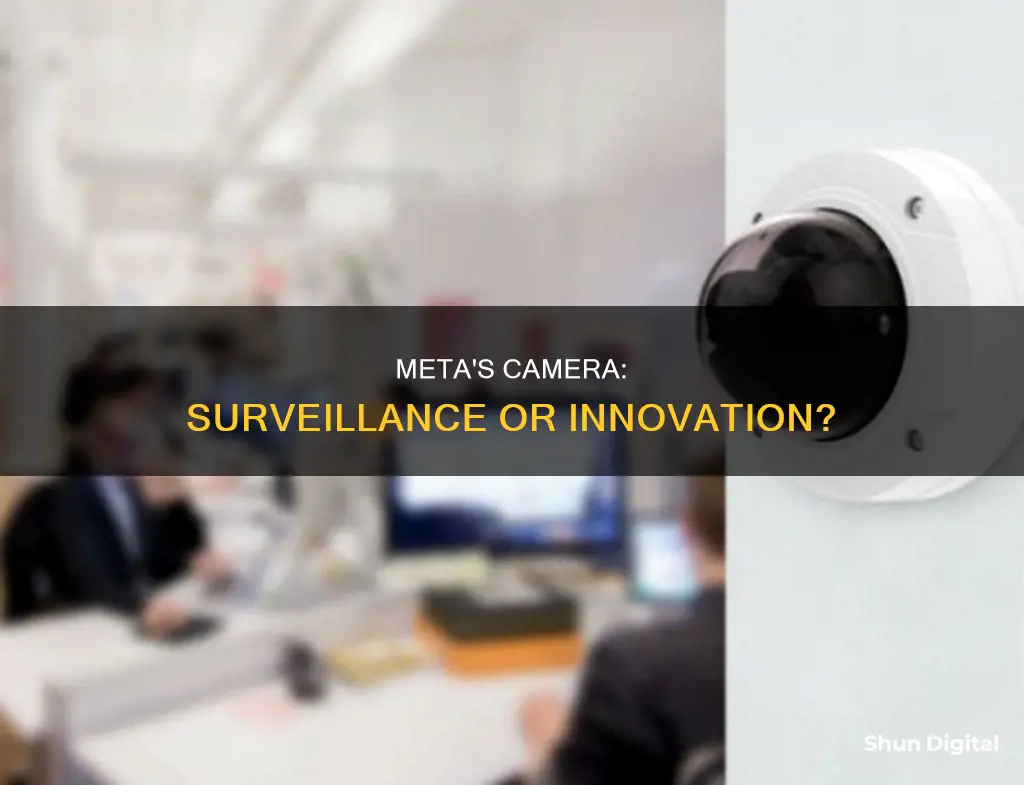
Meta's new Ray-Ban smart glasses, which feature a built-in camera, have sparked concerns about surveillance and privacy. The glasses enable wearers to secretly capture photos and videos of strangers in public spaces without their knowledge or consent. This has raised questions about the ethical implications of such technology and its potential impact on privacy and distraction. While Meta has addressed privacy concerns, the glasses' ability to discreetly record and stream content has sparked a broader discussion about the future of computing and the potential shift towards wearable technology.
| Characteristics | Values |
|---|---|
| Name | Ray-Ban Meta Glasses |
| Price | $300 |
| Features | Camera, speakers, microphones |
| Purpose | To "live in the moment" while sharing what you see with the world |
| Privacy Concerns | Secretly snapping photos and recording videos of strangers |
| LED Light | Embedded in the right frame to indicate when the device is recording |
| Tamper-Detection Technology | To prevent users from covering up the LED light with tape |
| Design | Sleek, lightweight, and stylish |
| Focus and Distraction | Constant preoccupation with the possibility of capturing photos and videos |
| Comparison with Smartphones | Similar privacy concerns, but glasses felt more distracting |
What You'll Learn

Meta's camera glasses are a privacy concern
The sleek and stylish design of the Meta glasses makes them virtually indistinguishable from ordinary glasses, and a tiny LED light that indicates when the device is recording is easily overlooked. This makes it possible for wearers to secretly snap photos and record videos of strangers in public places without their knowledge or consent. Although Meta has stated that privacy was a top priority in the design of the glasses, the potential for covert surveillance is undeniable.
The implications of this new technology for privacy are significant. Wearers of the glasses could easily invade the privacy of others by capturing photos and videos without their consent. This could lead to concerns about personal space and safety, especially in public places. Additionally, the data collected through these glasses could be used for targeted advertising or sold to third parties, further eroding privacy.
The always-on nature of the glasses also raises concerns about the constant distraction they may cause. Even when not actively using the device, the wearer may feel preoccupied with the possibility of capturing photos or videos. This could impact their ability to focus and be present in the moment, contrary to Meta's marketing message.
While the Meta camera glasses offer new ways to capture and share experiences, they also present significant privacy concerns that cannot be overlooked. As this technology becomes more prevalent, it is crucial to address the potential implications for personal privacy and find ways to mitigate these risks. Striking a balance between innovation and privacy protection will be essential in shaping the future of such wearable devices.
Fighting a NY Speeding Ticket: What You Need to Know
You may want to see also

The glasses are a distraction
Meta's new $300 Ray-Ban smart glasses are a distraction, both for the wearer and for those around them. The glasses, which feature a built-in camera, speakers, and microphones, are designed to help users "live in the moment" by allowing them to share their experiences with the world. However, the very presence of these recording devices can be a distraction, disrupting the very moments they aim to capture.
For the wearer, the glasses can be a source of constant preoccupation. Even when not actively using the device, the mere possibility of recording can occupy one's thoughts. This distraction can have practical consequences, such as impairing concentration while driving or performing other tasks. The glasses may also cause physical discomfort, with the reflection from car headlights creating a harsh, blue strobe effect.
For those around the wearer, the glasses can be a distraction in the form of an intrusion. The covert nature of the recording device means that people may be unknowingly photographed or filmed, raising serious privacy concerns. While the glasses include a small LED light to indicate when the device is recording, it is easy to overlook, and most people would find it rude to stare at or comment on a stranger's glasses. This subtle form of surveillance enables bad actors to more easily invade the privacy of others.
The distraction caused by the glasses extends beyond the personal level and has broader societal implications. The ubiquity of such devices could herald a new age of surveillance, with potential consequences for our collective ability to focus and be present. While the glasses may offer some novel features, such as the ability to capture slice-of-life moments, the benefits may not outweigh the costs of lost privacy and increased distraction.
In conclusion, while Meta's new smart glasses may offer some interesting capabilities, their distracting nature cannot be overlooked. The potential for constant recording and surveillance can disrupt both individual focus and societal norms, raising important questions about the role of technology in our lives.
Surveillance Camera Surveys: Privacy and Security Reporting
You may want to see also

They offer little new functionality
The $300 Ray-Ban Meta glasses, a collaboration between Mark Zuckerberg's social networking empire and the iconic eyewear maker, have been touted as a revolutionary new device that can help users "live in the moment" while sharing their experiences with the world. However, despite their sleek design and built-in camera, microphone, and speaker capabilities, the glasses offer little in terms of new functionality.
The primary purpose of the Meta glasses is to allow users to livestream and capture photos and videos of their surroundings hands-free. While this may be convenient for certain activities, it is not a novel concept. Smartphones and other dedicated devices have been capable of capturing and sharing content for years. The Meta glasses simply offer a different form factor for performing these familiar tasks.
In addition, the glasses may cause more harm than good. The hands-free nature of the device could make it easier for bad actors to secretly capture photos and videos of unsuspecting individuals, raising serious privacy concerns. Furthermore, the always-on nature of the device could lead to constant preoccupation with capturing content, distracting users from the present moment and affecting their ability to focus.
During a test drive of the glasses, the reviewer found that the device did not significantly improve their daily experiences. They noted that the glasses made them feel more distracted and that the reflection from car headlights caused a distracting blue strobe effect. Additionally, the reviewer found that the glasses did not enhance their bouldering experience and, in fact, made their performance worse due to the pressure of recording and broadcasting.
While the Meta glasses may have some niche use cases, such as capturing slice-of-life moments or hands-free recording during certain activities, they do not offer any groundbreaking new functionality. The device faces the challenge of convincing consumers to adopt smart glasses despite the potential costs of lost privacy and increased distraction.
Understanding Camera Raw CS4: A Beginner's Guide
You may want to see also

The glasses are a surveillance tool
The glasses are designed to "help you live in the moment and share what you see with the world." However, the presence of a hidden camera and the potential for covert recording goes against the idea of living in the moment. The camera can be used to snap photos and record videos of people without their knowledge or consent, invading their privacy and turning them into subjects of surveillance.
The implications of these glasses for privacy are significant. The camera can be used to capture and share personal moments, slice-of-life moments, and intimate details of people's lives without their permission. While Meta has included a tiny LED light to indicate when the device is recording, it is easy to overlook, and most people may not even notice it. This feature does little to alleviate the privacy concerns.
Additionally, the glasses have the potential to distract the wearer and those around them. The constant preoccupation with capturing moments and the possibility of a harsh, blue strobe effect from car headlights can be distracting and impact the wearer's ability to focus.
The Meta glasses, with their hidden camera, represent a new form of surveillance that is easily accessible to the public. They enable anyone to become a surveillance agent, capturing and sharing moments of strangers' lives without their knowledge or consent. This raises ethical questions about the boundaries of privacy and the potential for misuse.
While the glasses offer a new way to interact with technology and share experiences, the presence of the hidden camera and its potential for covert recording and surveillance cannot be overlooked. The implications for privacy and focus are concerning and should be carefully considered before adopting this technology.
The Evolution of Canon Cameras: Where Are They Made?
You may want to see also

They are an extension of existing technology
Meta's new Ray-Ban smart glasses are an extension of existing technology. They are the latest in a line of wearable face computers, with previous examples including Google Glass and Snap's Spectacles. These lightweight, stylish glasses are the result of a collaboration between Meta and the iconic eyewear maker, Ray-Ban.
The glasses include a camera for capturing photos and videos, as well as speakers and microphones for listening to music and making phone calls. This technology is not new and is merely an extension of the capabilities of smartphones. In fact, the glasses don't offer much that we can't already do with our phones.
The broader ambition in Silicon Valley is to shift computing away from smartphone and computer screens and towards our faces. Meta, Apple, and Magic Leap have all been developing mixed-reality headsets that use cameras to allow their software to interact with objects in the real world. These companies claim that wearable face computers could eventually change the way we live and work.
While the design of the Ray-Ban Meta glasses is minimalist and sleek, the concept of smart glasses is not new. Previous attempts, such as Google Glass and Snap's Spectacles, were flops. However, the new Meta glasses blend effortlessly into everyday life, and it is difficult to tell them apart from ordinary glasses. This makes it easier to secretly snap photos and record videos of strangers without them noticing, raising concerns about privacy and surveillance.
Despite the implications for privacy and focus, some apps could make smart glasses eventually go mainstream. For example, a holographic teleprompter that displays talking points during presentations could be a killer app. While the Meta glasses may not be a revolutionary product, they are a step towards the broader ambition of shifting computing towards our faces.
Complete Recharge: DMC-ZS60 Camera Battery Charging Guide
You may want to see also
Frequently asked questions
The Meta Ray-Ban glasses are a $300 pair of smart glasses that Mark Zuckerberg's social networking empire made in collaboration with the iconic eyewear maker. They include a camera for shooting photos and videos, and an array of speakers and microphones for listening to music and talking on the phone.
The glasses include a tiny LED light embedded in the right frame to indicate when the device is recording. When a photo is snapped, the light flashes momentarily. When a video is recording, the light stays on.
There are concerns about privacy and surveillance, as well as the potential impact on our ability to focus and the distraction caused by the glasses.
Meta has stated that privacy was a top priority when designing the glasses and that they have implemented safety measures such as tamper-detection technology to prevent users from covering up the LED light.
The glasses can help you "live in the moment" while sharing what you see with the world. They can also be used to capture slice-of-life moments that you wouldn't normally record because your hands are preoccupied.







